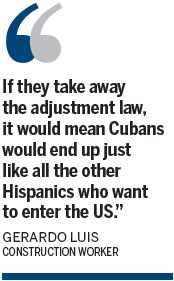Detente spawns Cuban worry on migration rights
Like tens of thousands of Cubans, Gerardo Luis wants to get to the United States and he's suddenly worried that time may be running out.
Across an island where migrating north is an obsession, the widespread jubilation over last week's historic US-Cuba detente is soured by fear that warming relations will eventually end Cubans' unique fast track to legal US residency.
For nearly a half-century, the Cuban Adjustment Act has given Cubans who arrive in the US a virtually guaranteed path to legal residency and eventual citizenship. The knowledge that they will be shielded from deportation has drawn hundreds of thousands of Cubans on perilous raft trips to Florida and land journeys through Central America and Mexico.
"If they take away the adjustment law, it would mean Cubans would end up just like all the other Hispanics who want to enter the US," said Luis, 36, a construction worker who said he may try to reach Mexico and walk across the border if he doesn't get a visa soon.
US officials say there are no immediate plans to change immigration laws or policy. But with the US and Cuba negotiating a return to full diplomatic relations, many Cubans are wondering how long their extraordinary privilege can survive under restored diplomacy, and are thinking about speeding up plans to get to the US.
"I don't know if they will take it away," Angela Moreno, a retiree, 67, said of the preferential treatment, "but if they do, Cubans who go to the United States will have to do it like people from other countries".
Cubans arriving at a US border or airport automatically receive permission to stay in the US under policies stemming from the 1966 act, which allows them to apply for permanent residency after a year, almost always successfully.
Seeking to discourage mass migrations by sea, the US developed its so-called "wet foot, dry foot policy", in which migrants who make it to the US are automatically allowed to stay. Those stopped at sea are either sent back to their homeland or to a third country if they can prove a credible fear of persecution.
'Modern relationship'
US Senator Bill Nelson, a Florida Democrat, said he welcomed US President Barack Obama's move to create a "modern relationship" with Cuba, but Congress is not likely to alter the Cuban Adjustment Act or the US trade embargo until there have been significant steps by the Cuban government.
"Major changes to a law like that or to the embargo are not going to happen unless people like me support those changes, and I'm not going to support them unless I see some movement toward freedom," Nelson said.
The US Interests Section, which handles US consular affairs in Havana in the absence of a full embassy, approved more than 33,000 non-immigrant visas for Cubans to visit the US last year, a 99 percent increase.

(China Daily 12/27/2014 page10)














